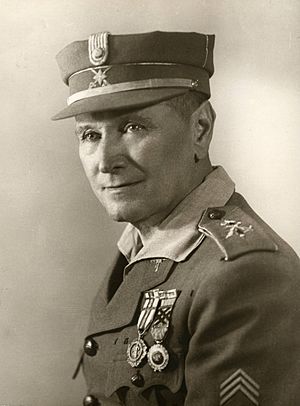Miguel Ponte facts for kids
Luis Miguel Limia Ponte y Manso de Zúñiga (1882-1952) was an important Spanish military leader. He was also known as the eighth Marqués de Bóveda de Limia. He played a role in the military uprising that led to the Spanish Civil War. During this time, he was part of the group that led the Nationalist side, called the Board of National Defense. He even served as the Chief of State for the Nationalist group for a few months in 1936. He held the high rank of Lieutenant General.
Contents
Early Life and Military Career
Miguel Ponte was born into an important family and owned a lot of land. In 1924, he was a colonel in the cavalry, which is a part of the army that used horses. When the Second Spanish Republic was created in 1931, he was a Brigadier General. He decided to retire from active military service at that time.
However, he later became involved in politics. On August 10, 1932, Ponte took part in a failed attempt to take control of the government, known as a coup d'état. This attempt was led by José Sanjurjo. When the coup failed, Miguel Ponte had to leave Spain and went to Portugal.
Role in the Spanish Civil War
In July 1936, another military uprising began in Spain. This event quickly led to the start of the Spanish Civil War. Miguel Ponte worked with General Andrés Saliquet to take control of a military area around Valladolid.
During the war, he commanded the 5th Infantry Division. Later, he became the Commander in Chief of two large groups of soldiers, known as Corps I and V, for the rebel army.
In December 1942, after the main fighting of the Civil War had ended, Miguel Ponte visited Gibraltar. He traveled by car and crossed the border. While there, he inspected a British Guard of Honour. He was accompanied by British Lieutenant-General Mason MacFarlane and other officers. They even watched a firing practice with Valentine tanks.
Later Life and Public Service
After the war, Miguel Ponte continued to serve in public roles. He was a procurador (which is like a representative or legislator) in the Cortes, which was Spain's parliament, in 1943 and 1949. He also served as the President of the Supreme Council of Military Justice, which was a high court for military matters.
See also
 In Spanish: Miguel Ponte para niños
In Spanish: Miguel Ponte para niños


